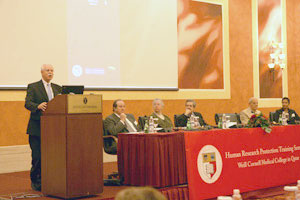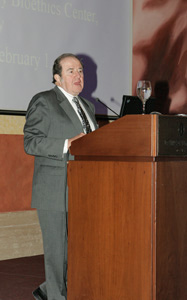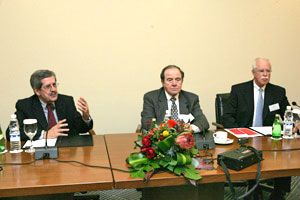WCMC-Q initiates training for clinical research

Extending WCMC-Q’s “strong collaboration” with
HMC to the field of clinical research, Dr. Gary B.
Schneider welcomes participants to the
Training Seminar.
Some 90 participants gathered at Doha’s Intercontinental Hotel, early February, for the first seminar in Qatar to train researchers and support staff in the protection of human volunteers involved in clinical research projects.
Organized by the Office of Research & Sponsored Programs of WCMC-Q, the two-day event paved the way for a “new phase” in the development of WCMC-Q’s triple mission, said Dr. Daniel R. Alonso, Dean of the Medical College, at a press conference held on the opening day.
“Our partnership with Hamad Medical Corporation is continuously developing in education, in patient care and in research for the benefit of the people of Qatar and the region,” Dr. Alonso said. “A milestone has been achieved: We are about to start a series of research programs. We are preparing for these in a responsible way, because part of the research will be clinical – meaning that human subjects will be incorporated into the studies. That brings an extraordinary responsibility.”
Participants from Hamad Medical Corporation (HMC) included physicians, nursing staff, officials from the department of medical education and administrators. From the WCMC-Q side, there were faculty members, and library, IT and research administration staff.

Dr. Robert J. Levine:
the intellectual framework guiding
the conduct of clinical research in
the US was developed during the
twentieth century.
Sessions during the first day traced the historical development of the ethical framework, and gave an overview of the federal regulations, governing research involving human subjects.
Presenters were Dr. Robert Levine of Yale University and Ms. Helen McGough of the University of Washington, Board members of Public Responsibility in Medicine and Research (PRIM&R), a non-profit organization dedicated to the ethical conduct of research.
On the second day, participants heard how Weill Cornell Medical College (New York) implements the regulations. The Medical College has two Institutional Review Boards (IRBs), tasked with reviewing the protocols for proposed research projects and monitoring their implementation.
Speakers from Weill Cornell were Ms Sheila Cohen Zimmet, Associate Dean of Research Compliance; Ms. Dorothy Hilpmann, Director of Research Subject Protection; and Dr. David Behrman, Chairman of the NewYork-Presbyterian Weill Cornell Medical Center Committee on Human Rights in Research.

"We are entering a new phase in the development of
WCMC-Q," said Dean Alonso, speaking at the press
conference, February 1st.
“You have to start with a public education strategy so that everyone really understands the intent, the impact and the possible benefits of the research,” he said.
He also confirmed that WCMC-Q was in the process of forming its own IRB, comprising faculty at the Medical College, physicians and staff from HMC, and lay members representing the general public.
In the education of professionals in Qatar (and the region), WCMC-Q has set the ball rolling with the first Arabic translation of The Belmont Report, the 1979 document that established the ethical framework for research involving human subjects in the United States.
More training materials are planned, said Dr. Schneider: “Our next initiative is to have an entire on-line training course in the protection of human research subjects translated into Arabic.” This development will be part of a broader strategy to provide ongoing training for personnel involved in clinical research.
All those who registered and attended the full two-day event in February received certificates from both Weill Cornell Medical College in New York and PRIM&R.
